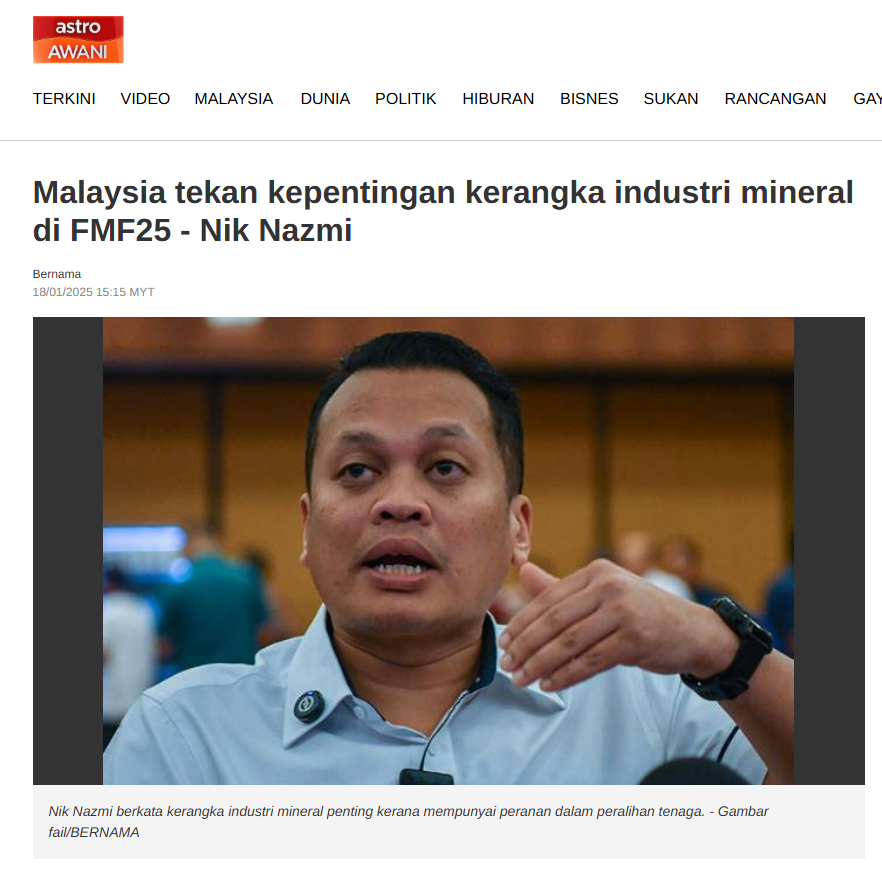
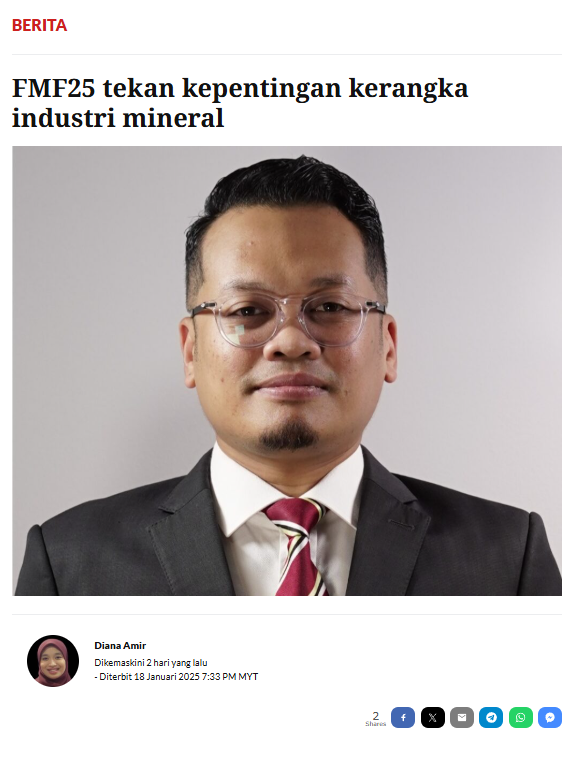
MALAYSIA menekankan kepentingan kerangka industri mineral yang lestari serta keperluan untuk dunia menangani ketegangan geopolitik pada Sesi Meja Bulat Peringkat Menteri sempena persidangan Future Minerals Forum 2025 (FMF25).
Menteri Sumber Asli dan Kelestarian Alam, Nik Nazmi Nik Ahmad berkata, FMF25 menekankan peranan pentingnya dalam membincangkan mengenai mineral kritikal, pengurusan sumber mineral, tenaga boleh baharu, perlombongan lestari dan mempromosikan integrasi dalam industri mineral secara serantau dan global.
“Dalam sesi tersebut, saya telah membangkitkan kepentingan kerangka industri mineral yang lestari memandangkan mineral mempunyai peranan penting dalam peralihan tenaga dan kemajuan teknologi.
“Di samping itu, saya juga menekankan keperluan untuk dunia menangani ketegangan geopolitik bagi memanfaatkan teknologi terbaik pada kos yang lebih rendah,” katanya FMF25
menerima lebih daripada 20,000 peserta dengan menampilkan 250 ahli panel dalam lebih daripada 70 sesi.
Nik Nazmi berkata, delegasi Malaysia turut berpeluang melawat King Abdul Aziz City for Science and Technology (KACST), sebuah institusi penyelidikan kebangsaan yang ditubuhkan untuk memajukan pembangunan saintifik dan teknologi di Arab Saudi.
“Saya juga berkesempatan mengadakan pertemuan dua hala dengan Menteri Industri dan Sumber Mineral Arab Saudi, Tuan Yang Terutama Bandar Alkhorayef dan ditemu bual beberapa agensi media antarabangsa.
“Saya turut berkongsi antaranya mengenai dasar pembangunan mineral negara, persaingan geopolitik dunia, cabaran pembangunan industri mineral, sumbangan industri kepada matlamat peralihan tenaga dan kemajuan teknologi, serta keperluan untuk penerapan prinsip alam sekitar, sosial dan tadbir urus (ESG) dalam industri mineral, ” ujarnya dalam kenyataan.
Tambah beliau, melihat kepada kejayaan dan sambutan yang luar biasa FMF pada kali ini serta faedah kepada negara-negara yang menyertai, beliau telah meminta Kementerian Sumber Asli dan Kelestarian Alam (NRES) mengkaji kesesuaian Malaysia untuk turut serta dalam pameran di FMF akan datang.
Terdahulu, FMF25 bertemakan Years of Impact diadakan selama tiga hari bermula pada 14 sehingga 16 Januari di Riyadh, Arab Saudi. – WILAYAHKU
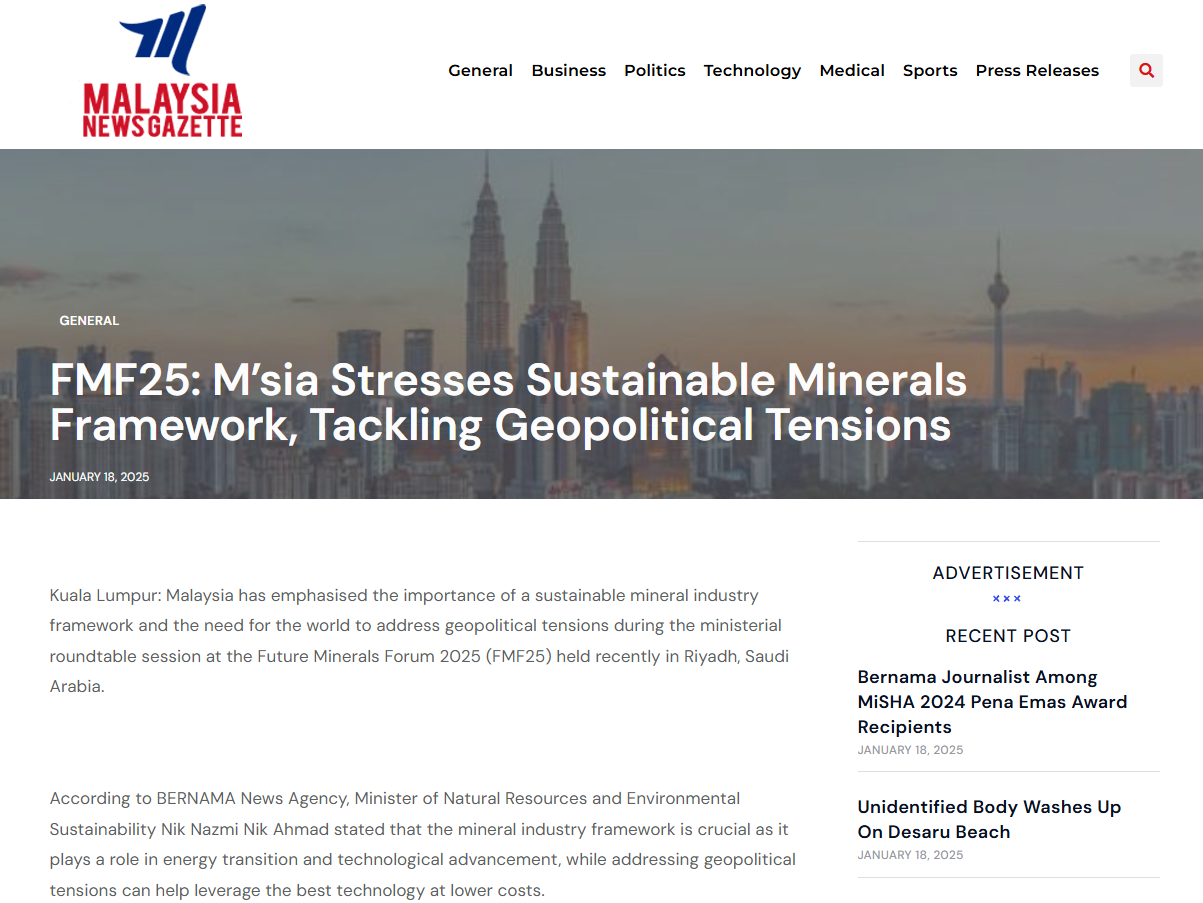
Kuala Lumpur: Malaysia has emphasised the importance of a sustainable mineral industry framework and the need for the world to address geopolitical tensions during the ministerial roundtable session at the Future Minerals Forum 2025 (FMF25) held recently in Riyadh, Saudi Arabia.
According to BERNAMA News Agency, Minister of Natural Resources and Environmental Sustainability Nik Nazmi Nik Ahmad stated that the mineral industry framework is crucial as it plays a role in energy transition and technological advancement, while addressing geopolitical tensions can help leverage the best technology at lower costs.
FMF25 welcomed more than 20,000 participants and featured 250 panelists over 70 sessions. Topics discussed included critical minerals, mineral resource management, renewable energy, sustainable mining, and promoting regional and global integration in the mineral industry.
Nik Nazmi mentioned that Malaysia will review the feasibility of participating in future FMF exhibitions after witnessing the success and extraordinary reception of this edition of the FMF and the benefits to all participating countries. FMF25, themed ‘Years of Impact,’ was held over three days from Jan 14
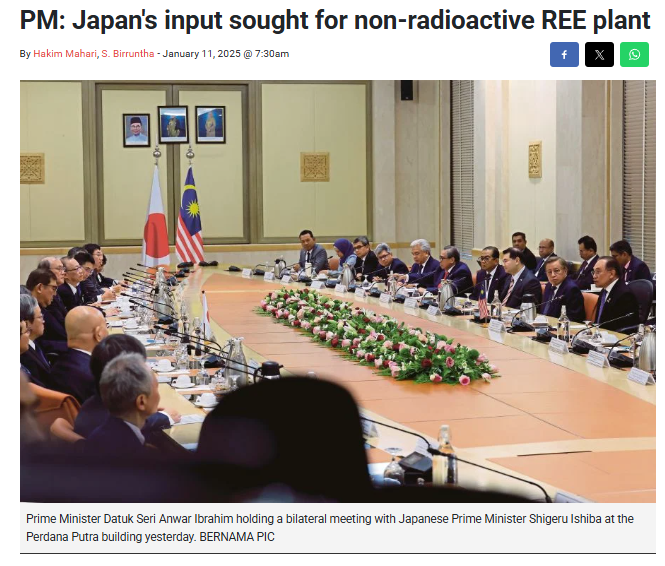
Prime Minister Datuk Seri Anwar Ibrahim has confirmed that Malaysia is seeking Japan's involvement in developing a non-radioactive rare earth element (NR-REE) processing plant.
"I mentioned to (Prime Minister Shigeru Ishiba) that Malaysia is looking to involve Japan in the development of the non-radioactive rare earth element processing plant," he said in a joint press conference with his Japanese counterpart.
While specific details of Japan's involvement remain undisclosed, the initiative reflects Malaysia's broader ambitions in the REE sector.
Malaysia holds an estimated 16.1 million tonnes of non-radioactive REEs, valued at RM800 billion, which positions the country as a key global supplier of these critical materials.
Resources and Environmental Sustainability Minister Nik Nazmi Nik Ahmad reportedly said Malaysia had great potential in the downstream rare earth elements industry as a super magnet-producing country, particularly to support the electric vehicle manufacturing industry's growth.
On Nov 28 last year, Economy Minister Rafizi Ramli underscored the importance of Malay-sia's east coast region in becoming a hub for large-scale industries and REE.
Rafizi, who spoke at the East Coast Economic Region Development Council forum, identified REE as a largely untapped resource with immense potential for economic growth over the next 10-15 years.
Meanwhile, economists and industry experts have praised the move while highlighting challenges.
Doris Liew, an economist with IDEAS Malaysia, said: "The potential rewards are significant.
"In addition to the RM800 billion in direct economic valuation, the REE sector could generate over 6,000 jobs, with additional economic spillover effects from capital investments, asset acquisition, and the construction and maintenance of extraction and processing facilities.
"Japan is a global leader in producing high-tech materials, including magnets, catalysts and electronic components.
"Collaborating with Japan could strengthen Malaysia's domestic REE processing industry, further mitigating the risks associated with over-reliance on Chinese supply chains and enhancing global supply chain resilience for these critical materials," she said.
Institute of Strategic and International Studies (ISIS) analyst Qarrem Kassim highlighted the alignment of this initiative with Malaysia's National Industrial Master Plan 2030.
"REEs are essential for modern technologies, including semiconductors, EV batteries and defence systems.
"A stable domestic supply could attract more investments in downstream industries such as permanent magnets and battery manufacturing," he said.
However, Qarrem also acknowledged environmental and policy concerns.
"Malaysia must ensure that any investment in the REE sector includes local processing to foster high-value industries rather than merely exporting raw materials.
"This approach could position Malaysia as a neutral alternative to global supply chain dominance," he added.
Universiti Kuala Lumpur Business School's Associate Professor Aimi Zulhazmi Abdul Rashid highlighted the need for environmental sustainability.
"The biggest threat to Malay-sia's environment is the unmitigated effects of rare earth processing plants. Research and development (R&D) is essential to address this issue," he said.
Aimi also stressed the importance of technology transfer from Japan.
"The value-added products from rare earth must have production and R&D bases in Malaysia. The supply chain must be developed domestically, with SMEs playing a prominent role as participants.
"If executed strategically, the rare earth industry could position Malaysia as a key global player. It would also provide strong bargaining power for Malaysia during geopolitical crises."
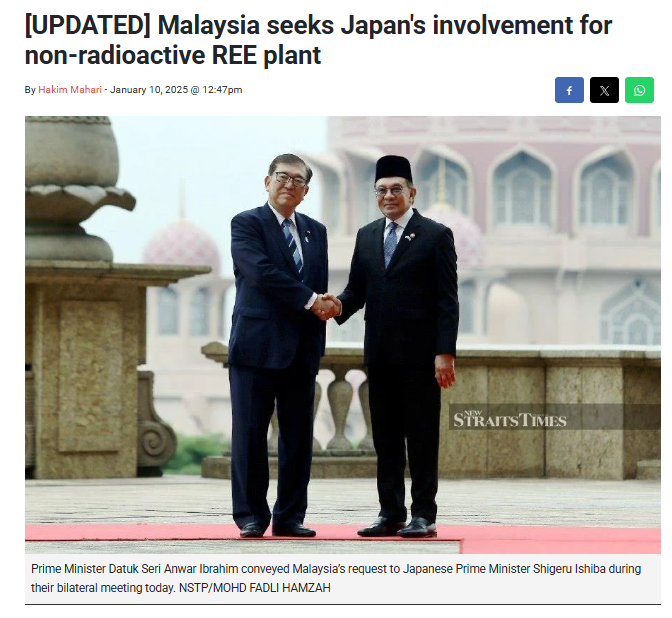
PUTRAJAYA: Prime Minister Datuk Seri Anwar Ibrahim has confirmed that Malaysia is seeking Japan's involvement in developing a Non-Radioactive Rare Earth Element (NR-REE) processing plant.
"I also mentioned to (Prime Minister Ishiba) that Malaysia is looking to involve Japan in the development of the Non-Radioactive Rare Earth Element (NR-REE) processing plant," he said during a joint press conference with his Japanese counterpart, Shigeru Ishiba.
.However, no further details on the plan to get Japan involved were provided.
Resources and Environmental Sustainability Minister Nik Nazmi Nik Ahmad reportedly said that Malaysia has great potential in the downstream rare earth elements (REE) industry as a super magnet-producing country, particularly for supporting the growth of the electric vehicle (EV) manufacturing industry.
The latest REE roadmap, which covers the entire supply chain, including the upstream, midstream, and downstream stages, was tabled at the sixth National Economic Action Council meeting of 2024, chaired by Prime Minister Datuk Seri Anwar Ibrahim.
On Nov 28 last year, Economy Minister Rafizi Ramli underscored the importance of Malaysia's east coast region in becoming a hub for large-scale industries and rare earth elements (REE).
Rafizi, speaking at the East Coast Economic Region Development Council (ECERDC) forum, identified REE as a largely untapped resource with immense potential for economic growth over the next 10-15 years.
He said energy transition plans must be executed as a long-term strategy.
Berita Terkini
Maklumat Perhubungan
Tel: (+603) 8871 6000
Faks: (+603) 8871 6145 / 46
Emel: helpdesk@jmg.gov.my
Waktu Perkhidmatan Kaunter Ibu Pejabat
Isnin - Jumaat
8.00 pg - 5.00 ptg
Waktu Rehat
Isnin - Khamis
1.00 ptg - 2.00 ptg
Jumaat
12.15 tgh - 2.45 ptg
Sabtu, Ahad dan Hari Kelepasan Am Tutup
"PELANGGAN HENDAKLAH BERPAKAIAN SOPAN DAN BERSESUAIAN"






